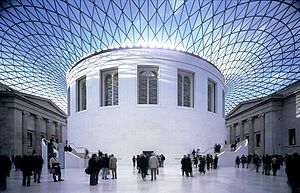
- Image via Wikipedia
Richard Stallman and Richard Grant, two people who I wouldn’t ever have expected to group together except based on their first name, have recently published articles that have made me think about what we mean when we talk about “Open†stuff. In many ways this is a return right to the beginning of this blog, which started with a post in which I tried to define my terms as I understood them at the time.
In Stallman’s piece he argues that “open†as in “open source†is misleading because it sounds limiting. It makes it sound as though the only thing that matters is having access to the source code. He dismisses the various careful definitions of open as specialist pleading, definitions that only the few are aware of, and that using them will confuse most others. He is of course right, no matter how carefully we define open it is such a commonly used word and so open to interpretation itself that there will always be ambiguity.
Many efforts have been made in various communities to find new and more precise terms, “gratis†and “libreâ€, “green†vs “goldâ€, but these never stick, largely because the word “open†captures the imagination in a way more precise terms do not, and largely because these terms capture the issues that divide us, rather than those that unite us.
So Stallman has a point but he then goes on to argue that “free†does not suffer from the same issues because it does capture an important aspect of Free Software. I can’t agree here because it seems clear to me we have exactly the same confusions. “Free as in beerâ€, “free as in free speech†capture exactly the same types of confusion, and indeed exactly the same kind of issues as all the various subdefinitions of open. But worse than that it implies these things are in fact free, that they don’t actually cost anything to produce.
In Richard Grant’s post he argues against the idea that the Faculty of 1000, a site that provides expert assessment of researcher papers by a hand picked group of academics, “should be open accessâ€. His argument is largely pragmatic, that running the service costs money. That money needs to be recovered in some way or there would be no service. Now we can argue that there might be more efficient and cheaper ways of providing that service but it is never going to be free. The production of the scholarly literature is likewise never going to be free. Archival, storage, people keeping the system running, just the electricity, these all cost money and that has to come from somewhere.
It may surprise overseas readers but access to many British museums is free to anyone. The British Museum, National Portrait Gallery and others are all free to enter. That they are not “free†in terms of cost is obvious. This access is subsidised by the taxpayer. The original collection of the British Museum was in fact donated to the British people, but in taking that collection on the government was accepting a liability. One that continues to run into millions of pounds a year, just to stop the collection from falling apart, let alone enhancing, displaying it, or researching it.
The decision to make these museums openly accessible is in part ideological, but it can also be framed as a pragmatic decision. Given the enormous monetary investment there is a large value in subsidising free access to maximise the social benefits that universal access can provide. Charging for access would almost certainly increase income, or at least decrease costs, but there would be significant opportunity cost in terms of social return on investment by barring access.
Those of us who argue for Open Access to the scholarly literature or for Open Data, Process, Materials or whatever need to be careful that we don’t pretend this comes free. We also need to educate ourselves more about the costs. Writing costs money, peer review costs money, editing the formats, running the web servers, and providing archival services costs money. And it costs money whether it is done by publishers operating a subscription or  author-pays business models, or by institutional or domain repositories. We can argue for Open Access approaches on economic efficiency grounds, and we can argue for it based on maximizing social return on investment, essentially that for a small additional investment, over and above the very large existing investment in research, significant potential social benefits will arise.
Open Access scholarly literature is free like the British Museum or a national monument like the Lincoln Memorial is free. We should strive to bring costs down as far as we can. We should defend the added value of investing in providing free access to view and use content. But we should never pretend that those costs don’t exist.

